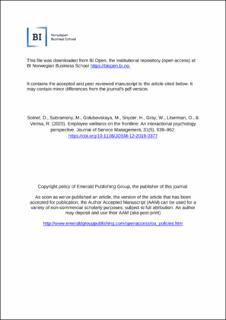| dc.contributor.author | Solnet, David | |
| dc.contributor.author | Subramony, Mahesh | |
| dc.contributor.author | Golubovskaya, Maria | |
| dc.contributor.author | Snyder, Hannah | |
| dc.contributor.author | Gray, Whitney | |
| dc.contributor.author | Liberman, Olga | |
| dc.contributor.author | Verma, Rohit | |
| dc.date.accessioned | 2021-06-15T11:23:22Z | |
| dc.date.available | 2021-06-15T11:23:22Z | |
| dc.date.created | 2020-07-16T11:30:48Z | |
| dc.date.issued | 2020 | |
| dc.identifier.citation | Journal of Service Management, 2020, Vol. 31 No. 5, pp. 939-952 | en_US |
| dc.identifier.issn | 1757-5818 | |
| dc.identifier.uri | https://hdl.handle.net/11250/2759534 | |
| dc.description.abstract | Purpose
Employee wellness is vital to creating high-quality employee–customer interactions, yet frontline service workers (FLSWs) do not typically engage in, or benefit from, wellness initiatives. This paper aims to conceptually model the interactive influences of organizational and employee factors in influencing FLSW involvement in wellness programs and provides suggestions on how service organizations can enhance wellness behaviors and outcomes.
Design/methodology/approach
This paper builds upon classical and contemporary management theories to identify important gaps in knowledge about how employees and firms engage with wellness. Interactive psychology, emphasizing multidirectional interaction between person (employee) and situation (organization) wellness orientation, is introduced.
Findings
The paper develops a model that can be used to assess organizational wellness program effectiveness by emphasizing the interaction of employee and organizational wellness orientation. The model illustrates that wellness effectiveness relies equally on employee agency through an active wellness orientation matched with the organizational wellness orientation.
Originality/value
This paper questions the dominant approaches to assessing the effectiveness of workplace wellness initiatives, arguing for a more humanistic and agentic perspective rather than traditional organizationally centered fiscal measures. | en_US |
| dc.language.iso | eng | en_US |
| dc.publisher | Emerald | en_US |
| dc.title | Employee wellness on the frontline: an interactional psychology perspective | en_US |
| dc.type | Journal article | en_US |
| dc.type | Peer reviewed | en_US |
| dc.description.version | acceptedVersion | en_US |
| dc.source.pagenumber | 939-952 | en_US |
| dc.source.volume | 31 | en_US |
| dc.source.journal | Journal of Service Management (JOSM) | en_US |
| dc.source.issue | 5 | en_US |
| dc.identifier.doi | 10.1108/JOSM-12-2019-0377 | |
| dc.identifier.cristin | 1819569 | |
| cristin.ispublished | true | |
| cristin.fulltext | postprint | |
| cristin.qualitycode | 1 | |
